- Clone
- TW7-16B4 (See other available formats)
- Regulatory Status
- RUO
- Other Names
- Latency Associated Peptide (LAP), Transforming growth factor-beta 1 (TGF-b1), TGFB1, DPD1
- Isotype
- Mouse IgG1, κ
- Ave. Rating
- Submit a Review
- Product Citations
- publications
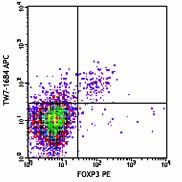
-

CD3+CD28+IL-2-stimulated C57BL/6 mouse splenocytes (48 hours) were surface stained with CD4 FITC and LAP (clone TW7-16B4) APC (top) or mouse IgG1, κ APC isotype control (bottom), then intracellularly stained with FOXP3 PE. Data shown was generated by gating on CD4+ lymphocyte population. -

| Cat # | Size | Price | Quantity Check Availability | Save | ||
|---|---|---|---|---|---|---|
| 141405 | 25 µg | $137 | ||||
| 141406 | 100 µg | $350 | ||||
Transforming growth factor beta (TGF-β) is a cytokine that has critical functions in the immune response by regulating Treg and Th17 cells. TGF-β is first synthesized as pro-TGF-β and then it is cleaved by furin proprotein convertase in the Golgi apparatus to produce the dimeric propeptides called latency-associate peptide (LAP) that non-covalently associates with the dimeric mature TGF-β to prevent its activity. This complex can further associate with latent-TGF-β-binding protein (LTBP) to produce a large latent form for deposition onto the extracellular matrix. The latent-TGF-β can be expressed on the membrane of activated Treg cells, immature dendritic cells, megakaryocytes, and platelets.
Product DetailsProduct Details
- Verified Reactivity
- Mouse
- Antibody Type
- Monoclonal
- Host Species
- Mouse
- Immunogen
- Mouse Tgfb1-transduced P3U1 cells
- Formulation
- Phosphate-buffered solution, pH 7.2, containing 0.09% sodium azide.
- Preparation
- The antibody was purified by affinity chromatography and conjugated with APC under optimal conditions.
- Concentration
- 0.2 mg/ml
- Storage & Handling
- The antibody solution should be stored undiluted between 2°C and 8°C, and protected from prolonged exposure to light. Do not freeze.
- Application
-
FC - Quality tested
- Recommended Usage
-
Each lot of this antibody is quality control tested by immunofluorescent staining with flow cytometric analysis. For flow cytometric staining, the suggested use of this reagent is ≤0.5 µg per million cells in 100 µl volume. It is recommended that the reagent be titrated for optimal performance for each application.
- Excitation Laser
-
Red Laser (633 nm)
- Application Notes
-
Clone TW7-16B4 has been reported to not cross-react with bovine LAP.2 Several anti-LAP antibody clones have been compared and characterized for their LAP reactivity.2 TW7-16B4 recognizes recombinant LAP, latent TGF-β, and pro-TGF-β.
Additional reported applications (for relevant formats) include: Western blotting1 and immunoprecipitation1. -
Application References
(PubMed link indicates BioLegend citation) -
- Oida T, et al. 2010. PLoS One 5:e15523. (FC, IP, WB)
- Oida T, et al. 2011. PLoS One 6:e18365. (Neut)
- Product Citations
-
- RRID
-
AB_10896418 (BioLegend Cat. No. 141405)
AB_10898159 (BioLegend Cat. No. 141406)
Antigen Details
- Structure
- Dimmers of latency-associated peptide non-covalently associated with dimmers of mature TGF-β
- Distribution
- Many cell types, highly expressed on activated Tregs and platelets
- Function
- TGF-β controls cell differentiation, tissue morphogenesis, cell growth, inflammation, matrix synthesis, apoptosis, and regulates immune response
- Ligand/Receptor
- TGF-β receptors
- Cell Type
- Tregs, Platelets, Dendritic cells
- Biology Area
- Apoptosis/Tumor Suppressors/Cell Death, Cell Biology, Immunology, Signal Transduction
- Molecular Family
- Cytokines/Chemokines, Growth Factors
- Antigen References
-
1. Oida T, et al. 2010. PLoS One 5:e15523.
2. Tran D, et al. 2009. P. Natl. Acad. Sci. USA 106:13445.
3. Ochi H, et al. 2006. Nat. Med. 12:627.
4. Oida T, et al. 2003. J. Immunol. 170:2516.
5. Nakamura K. 2001. J. Exp. Med. 194:629.
6. Miyazono K, et al. 1993. Growth Factors 8:11. - Gene ID
- 21803 View all products for this Gene ID
- UniProt
- View information about LAP on UniProt.org
Other Formats
View All LAP Reagents Request Custom Conjugation| Description | Clone | Applications |
|---|---|---|
| Purified anti-mouse LAP (TGF-β1) | TW7-16B4 | FC,IP,WB |
| PE anti-mouse LAP (TGF-β1) | TW7-16B4 | FC |
| APC anti-mouse LAP (TGF-β1) | TW7-16B4 | FC |
| Brilliant Violet 421™ anti-mouse LAP (TGF-β1) | TW7-16B4 | FC |
| PerCP/Cyanine5.5 anti-mouse LAP (TGF-β1) | TW7-16B4 | FC |
| Biotin anti-mouse LAP (TGF-β1) | TW7-16B4 | ELISA Detection |
| FITC anti-mouse LAP (TGF-β1) | TW7-16B4 | FC |
Customers Also Purchased
Compare Data Across All Formats
This data display is provided for general comparisons between formats.
Your actual data may vary due to variations in samples, target cells, instruments and their settings, staining conditions, and other factors.
If you need assistance with selecting the best format contact our expert technical support team.
-
Purified anti-mouse LAP (TGF-β1)
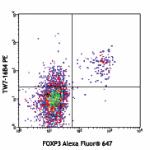
C57BL/6 mouse splenocytes were stimulated with anti-mouse CD... 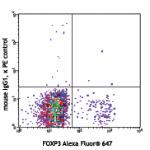
-
PE anti-mouse LAP (TGF-β1)

C57BL/6 mouse splenocytes were stimulated with anti-mouse CD... 
-
APC anti-mouse LAP (TGF-β1)
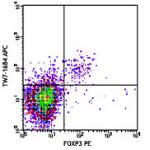
CD3+CD28+IL-2-stimulated C57BL/6 mouse splenocytes (48 hours... 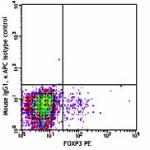
-
Brilliant Violet 421™ anti-mouse LAP (TGF-β1)
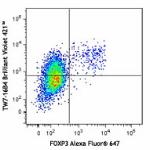
C57BL/6 mouse splenocytes were stimulated with CD3, CD28, an... 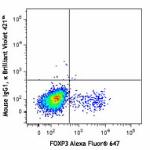
-
PerCP/Cyanine5.5 anti-mouse LAP (TGF-β1)

C57BL/6 mouse splenocytes were stimulated with anti-mouse CD... -
Biotin anti-mouse LAP (TGF-β1)
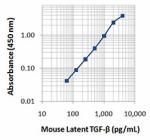
-
FITC anti-mouse LAP (TGF-β1)
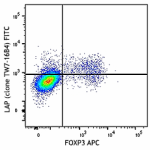
C57BL/6 mouse splenocytes were stimulated with CD3, CD28, an... 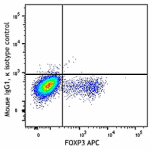
 Login/Register
Login/Register 










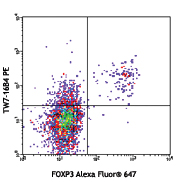
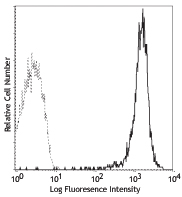




Follow Us